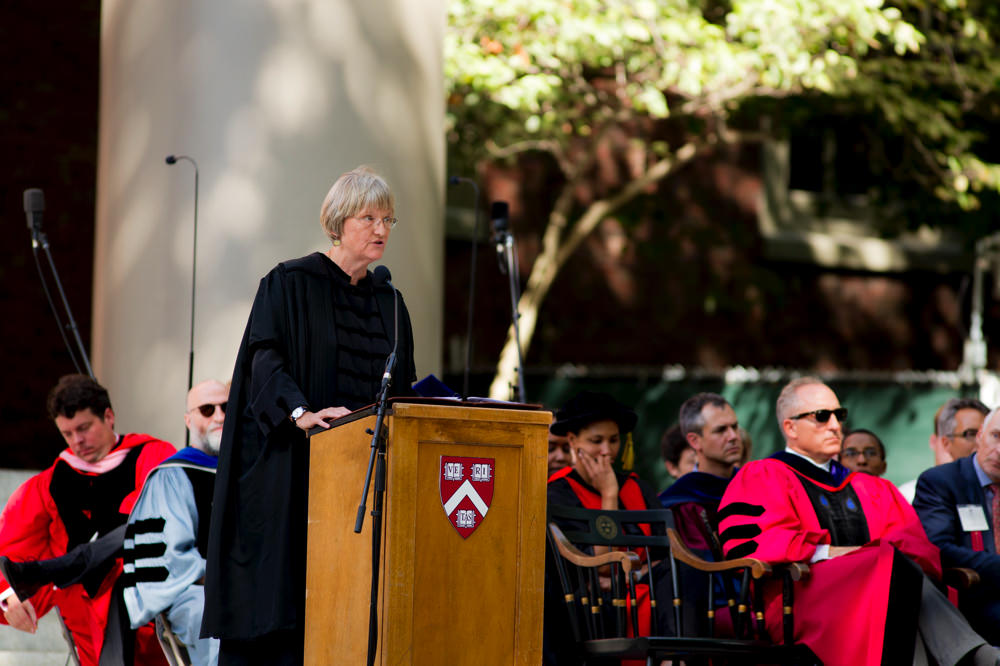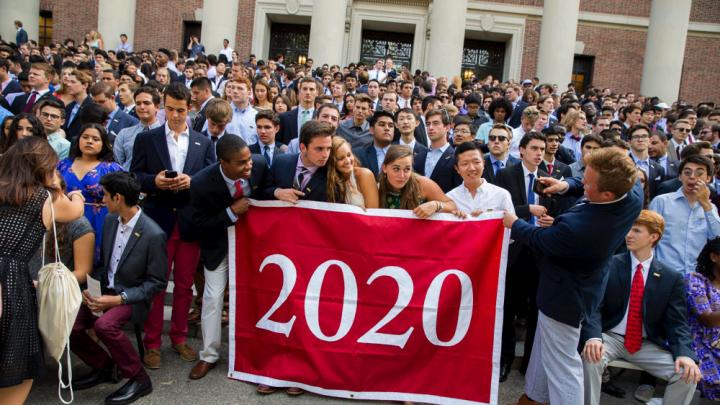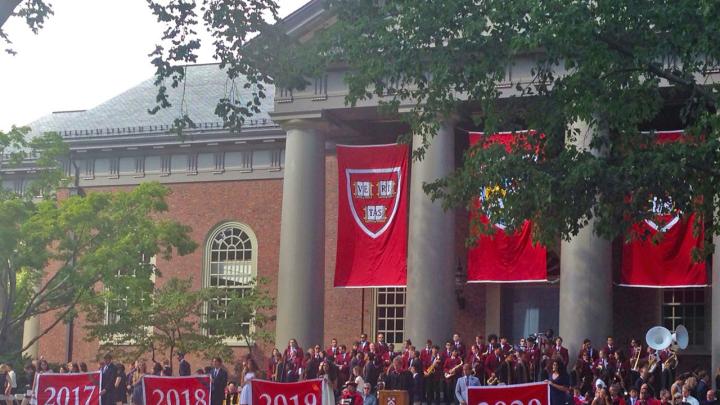Each new Harvard class will gather together on just two occasions before they graduate—once during Commencement week, at President Drew Faust’s baccalaureate address; and at Freshman Convocation, for which the Class of 2020 gathered on a mercifully cool August afternoon. Faust and College dean Rakesh Khurana remind freshmen each year that they’re experts at succeeding—“Once again, I’ve been reminded why I didn’t get into Harvard,” Khurana said—and yet Harvard is also a time to unlearn what it means to be successful, to embrace and understand the humility, risk-taking, and generosity that drive intellectual progress.
Faust and Khurana’s words were marked by a tone more somber than normal this year, as they acknowledged the tragedies that have shaken the world, and what they might tell us about the purpose of a university. “Media present us with an unrelenting flow of heartbreaking images of war, displacement, injured children, and desperate refugees,” Faust said. “And we have seen within our own nation startling public expressions of hatred and bigotry distressingly at odds with values fundamental to who we believe ourselves to be—as citizens of this nation and of the world and as members of this University community. You arrive here at a moment when institutions like this one confront profound challenges to their identity, purposes, and principles.”
These circumstances call on the members of an intellectual community, and today’s generation of students in particular, to tell the truth about the world, and to sharpen their capacities for finding it, Faust continued. “It was on this annual occasion of welcoming the incoming College class that a former dean of the Faculty Arts and Sciences, the late Jeremy Knowles, vividly described what he saw as the most important goal of higher education: to enable graduates to recognize when ‘someone is talking rot.’” But telling the truth also demands something more of students—it requires that they engage in discussions that might be deeply unsettling, and that they view it as a duty to read the ideas of others with generosity: “I know it isn’t risk-free to put forward an idea and seek to defend it. It takes courage. And it also requires trust—trust that the idea will be given a fair shot by generous listeners who see themselves as part of a shared commitment to, and search for, truth.”

President Drew Faust delivers the Convocation address.
Photograph by Rose Lincoln/Harvard Public Affairs and Communications
Emma Woo ’17, who delivered the traditional speech from a member of the senior class, offered a similar idea: It is tempting, she said, to go through Harvard with the aim of eliding distinctions among peers, avoiding conversations that might make others uncomfortable and challenge students’ own sense of self. She recalled a tense disagreement with a friend about religion, which for Woo always had been a source of strength and beauty: “We both had to reevaluate our assumptions and judgments of the other’s statements and learn how to feel unsettled with our opinions. It meant reevaluating our narratives to no longer be just tools to find similarities with one another, but instead also markers of uniqueness that we could share,” she stressed. “This was a moment of realization for me: within all the common ground I was finding with people around me, I had assumed that engaging with difference was less important to my personal growth than embracing similarity, and I was starting to realize that I was wrong.” The experience moved her to join the Interfaith Forum (which she now leads) and engage with other faith traditions, and, crucially, to make calling out difference central to her life.
Subtly, President Faust seemed to critique not only racial and religious hatred from the right, but also the language that has animated left-wing debates over campus politics, a theme she also raised in her Commencement address last spring. Both forces, she suggested, are at odds with the values of a university: “Universities must be places open to the kind of debate that can change ideas and committed to the standards of reason and evidence that form the bases for evaluating them.”
“Talk a lot, listen even more,” Faust urged, closing her address. “And listen generously, so that others may take risks, too.” (Her speech was disseminated to the community after Convocation.)
Khurana, speaking on the same theme that he had imparted to the last two entering classes, told students to make Harvard a transformational experience, not a transactional one, and to let their decisions be guided by conviction and sincerity, not by the promise of the next reward—medical school, Silicon Valley, Wall Street. “I urge you to be idealists,” he said. “At the same time, Harvard will test your idealism, as it should…You will become more skeptical, and more critical. The skeptical and critical gaze is important; it allows us to question authority and received wisdom…but there is the danger that skepticism can mutate into cynicism,” he warned. “If you become facile at critiquing ideas and institutions, over time, you may only see what is wrong in the world…you may argue that friendship, altruism, compassion, and cooperation are disguised self-interest….You may lose your capacity to imagine a future worth striving and sacrificing for….I want to urge you to be skeptical, but I want you to remain idealists—skeptical idealists. Believe what you do with your lives matters.”
Martin J. Grasso ’78, president of the Harvard Alumni Association, then presented the Class of 2020’s crimson banner, which was followed by a rendition of “Fair Harvard” and a recessional sending the first-years to gather for their class photo on the steps of Widener.









